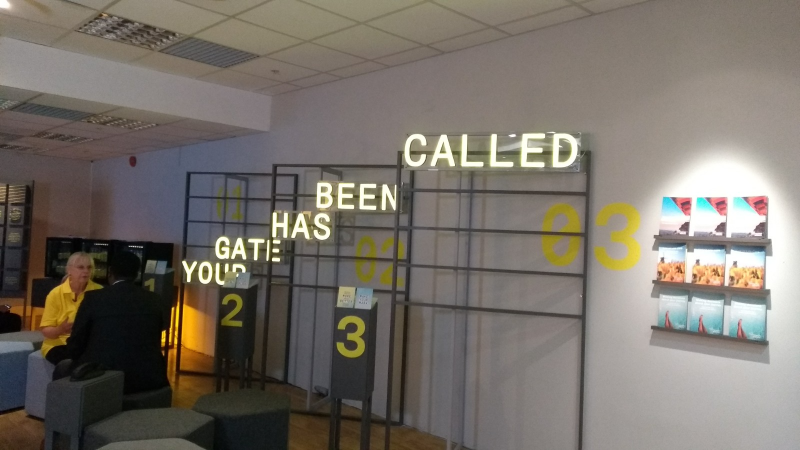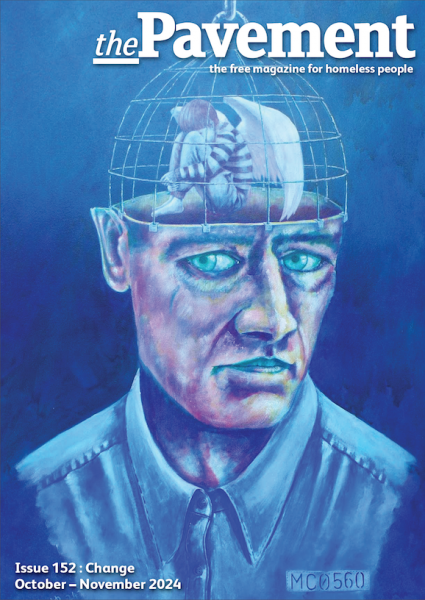
Established 2005 Registered Charity No. 1110656
Scottish Charity Register No. SC043760
DONATE
RECENT TWEETS
Everyone deserves to die with dignity and respect says Andrew Knee from St Mungo’s palliative care.
* FAQ means: "Frequently Asked Questions"
 The Departure Lounge: popped up
in Lewisham shopping centre, in May,
to help people talk more openly about
death. Serious stuff but there was
plenty to giggle about including what
people say to avoid using the D word,
such as kick the bucket, pushing up the
daisies, popped your clogs… © AK
The Departure Lounge: popped up
in Lewisham shopping centre, in May,
to help people talk more openly about
death. Serious stuff but there was
plenty to giggle about including what
people say to avoid using the D word,
such as kick the bucket, pushing up the
daisies, popped your clogs… © AK
Q: Why don’t people know much about dying?
There’s such a taboo about talking about death. What we need to do is communicate better and talk to one another. Certain cultures are better at celebrating a person’s life – think of the Mexican Day of the Dead or the jazz funerals of New Orleans.
Q: When will I stop feeling so sad?
The famous five stages of grief include denial, anger, bargaining, depression and acceptance. But not a lot of people know that these aren’t necessarily linear. All five stages could be mixed up. You might even have two at the same time.
Q: Why’s it good to talk about dying?
People need to feel in charge. Then they are more inclined to take part and use the service.
Q: How does palliative care help?
Well if you were close to death with a terminal illness, I’d help you live your last months the best you can. We’d talk on a one-to-one basis and I’d ask you what you want and make sure that was respected. For example: Do you want treatment? Would you refuse resuscitation? Do you want to be remembered or not? What about burial or cremation? Support doesn’t stop when that person dies – everyone’s affected by that person passing. We can offer emotional and practical support and a befriender service.
Sometimes people don’t feel that they deserve a choice because of their past – for example if they have cirrhosis of the liver. But you do deserve a choice about how you want to die and how to have your wishes heard. We want to make sure people have that choice.
Q: Andy, what’s your own end of
life plan?
If I was terminally ill, I would:
1. Prefer to die at home or in a
hospice.
2. Like a view from my bed and I’d
like music.
3. Want to be cremated.
In a nutshell
- St Mungo’s website helps explain everything about death and dying, from treatment to funerals, www.homelesspalliativecare.com
- Compassion in Dying helps people plan for the end of life. Free info line open MondayFriday, 9am–5pm on 0800 999 2434 www.compassionindying.org.uk
- Gentle Dusk organises workshops to empower communities to talk about death and plan for the end of life, www.gentledusk.org.uk See Death Café on p14.
- Dying Matters aims to change
the public's knowledge, attitudes
and behaviours towards dying,
death, and bereavement, www.dyingmatters.org
Time for a change?
“Hostels are not care homes, though some could be as the health needs of residents are so high. There needs to be some kind of specialist hospice for people who’ve been homeless,” says Martin Murphy Homeless Health Peer Advocacy (HHPA) manager at Groundswell, the homeless health charity. “People experiencing homelessness may go into palliative care at a younger age and die for different reasons – organ failure and/or problems with continued use of drugs for example.
If you have a number of people in need of palliative care within a hostel and there are no nursing staff on site, are those residents really receiving the level of care they need? Some of these people have been excluded all their lives, let’s not exclude them at the end of their lives."
- If you need support for your health care – a companion or a champion – Groundswell can help. Call 020 7725 2851 www.groundswell.org.uk
- Also cut out and keep the health care card on the back page to make sure a GP will see you.
- Lots of good info about handling cancer on www.macmillan.org.uk
October – November 2024 : Change
CONTENTS
BACK ISSUES
- Issue 152 : October – November 2024 : Change
- Issue 151 : August – September 2024 : Being Heard
- Issue 150 : June – July 2024 : Reflections
- Issue 149 : April – May 2024 : Compassion
- Issue 148 : February – March 2024 : The little things
- Issue 147 : December 2023 – January 2024 : Next steps
- Issue 146 : October 2023 – November 2023 : Kind acts
- Issue 145 : August 2023 – September 2023 : Mental health
- Issue 144 : June 2023 – July 2023 : Community
- Issue 143 : April 2023 - May 2023 : Hope springs
- Issue 142 : February 2023 - March 2023 : New Beginnings
- Issue 141 : December 2022 - January 2023 : Winter Homeless
- Issue 140 : October - November 2022 : Resolve
- Issue 139 : August - September 2022 : Creativity
- Issue 138 : June - July 2022 : Practical advice
- Issue 137 : April - May 2022 : Connection
- Issue 136 : February - March 2022 : RESPECT
- Issue 135 : Dec 2021 - Jan 2022 : OPPORTUNITY
- Issue 134 : September-October 2021 : Losses and gains
- Issue 133 : July-August 2021 : Know Your Rights
- Issue 132 : May-June 2021 : Access to Healthcare
- Issue 131 : Mar-Apr 2021 : SOLUTIONS
- Issue 130 : Jan-Feb 2021 : CHANGE
- Issue 129 : Nov-Dec 2020 : UNBELIEVABLE
- Issue 128 : Sep-Oct 2020 : COPING
- Issue 127 : Jul-Aug 2020 : HOPE
- Issue 126 : Health & Wellbeing in a Crisis
- Issue 125 : Mar-Apr 2020 : MOVING ON
- Issue 124 : Jan-Feb 2020 : STREET FOOD
- Issue 123 : Nov-Dec 2019 : HOSTELS
- Issue 122 : Sep 2019 : DEATH ON THE STREETS
- Issue 121 : July-Aug 2019 : INVISIBLE YOUTH
- Issue 120 : May-June 2019 : RECOVERY
- Issue 119 : Mar-Apr 2019 : WELLBEING
- Issue 118 : Jan-Feb 2019 : WORKING HOMELESS
- Issue 117 : Nov-Dec 2018 : HER STORY
- Issue 116 : Sept-Oct 2018 : TOILET TALK
- Issue 115 : July-Aug 2018 : HIDDEN HOMELESS
- Issue 114 : May-Jun 2018 : REBUILD YOUR LIFE
- Issue 113 : Mar–Apr 2018 : REMEMBRANCE
- Issue 112 : Jan-Feb 2018
- Issue 111 : Nov-Dec 2017
- Issue 110 : Sept-Oct 2017
- Issue 109 : July-Aug 2017
- Issue 108 : Apr-May 2017
- Issue 107 : Feb-Mar 2017
- Issue 106 : Dec 2016 - Jan 2017
- Issue 105 : Oct-Nov 2016
- Issue 104 : Aug-Sept 2016
- Issue 103 : May-June 2016
- Issue 102 : Mar-Apr 2016
- Issue 101 : Jan-Feb 2016
- Issue 100 : Nov-Dec 2015
- Issue 99 : Sept-Oct 2015
- Issue 98 : July-Aug 2015
- Issue 97 : May-Jun 2015
- Issue 96 : April 2015 [Mini Issue]
- Issue 95 : March 2015
- Issue 94 : February 2015
- Issue 93 : December 2014
- Issue 92 : November 2014
- Issue 91 : October 2014
- Issue 90 : September 2014
- Issue 89 : July 2014
- Issue 88 : June 2014
- Issue 87 : May 2014
- Issue 86 : April 2014
- Issue 85 : March 2014
- Issue 84 : February 2014
- Issue 83 : December 2013
- Issue 82 : November 2013
- Issue 81 : October 2013
- Issue 80 : September 2013
- Issue 79 : June 2013
- Issue 78 : 78
- Issue 77 : 77
- Issue 76 : 76
- Issue 75 : 75
- Issue 74 : 74
- Issue 73 : 73
- Issue 72 : 72
- Issue 71 : 71
- Issue 70 : 70
- Issue 69 : 69
- Issue 68 : 68
- Issue 67 : 67
- Issue 66 : 66
- Issue 65 : 65
- Issue 64 : 64
- Issue 63 : 63
- Issue 62 : 62
- Issue 61 : 61
- Issue 60 : 60
- Issue 59 : 59
- Issue 58 : 58
- Issue 57 : 57
- Issue 56 : 56
- Issue 56 : 56
- Issue 55 : 55
- Issue 54 : 54
- Issue 53 : 53
- Issue 52 : 52
- Issue 51 : 51
- Issue 50 : 50
- Issue 49 : 49
- Issue 48 : 48
- Issue 47 : 47
- Issue 46 : 46
- Issue 45 : 45
- Issue 44 : 44
- Issue 43 : 43
- Issue 42 : 42
- Issue 5 : 05
- Issue 4 : 04
- Issue 2 : 02
- Issue 1 : 01
- Issue 41 : 41
- Issue 40 : 40
- Issue 39 : 39
- Issue 38 : 38
- Issue 37 : 37
- Issue 36 : 36
- Issue 35 : 35
- Issue 34 : 34
- Issue 33 : 33
- Issue 10 : 10
- Issue 9 : 09
- Issue 6 : 06
- Issue 3 : 03
- Issue 32 : 32
- Issue 31 : 31
- Issue 30 : 30
- Issue 29 : 29
- Issue 11 : 11
- Issue 12 : 12
- Issue 13 : 13
- Issue 14 : 14
- Issue 15 : 15
- Issue 16 : 16
- Issue 17 : 17
- Issue 18 : 18
- Issue 19 : 19
- Issue 20 : 20
- Issue 21 : 21
- Issue 22 : 22
- Issue 23 : 23
- Issue 24 : 24
- Issue 25 : 25
- Issue 8 : 08
- Issue 7 : 07
- Issue 26 : 26
- Issue 27 : 27
- Issue 28 : 28
- Issue 1 : 01
